Mistakes are inevitable. Although there are a lot of mistakes you can do while applying for a remote job, there are a few that a lot of candidates make. These mistakes are somewhat non-obvious when seen from a vanity point and might apply to companies not hiring remotely as well.
Learn from the mistakes of others; you can't live long enough to make them all yourselves. - Chanakya
We asked on Twitter - "What are the biggest mistakes one can make while applying for a remote job?". Although the results were not skewed like most polls, the general consensus aligned with a few key points.
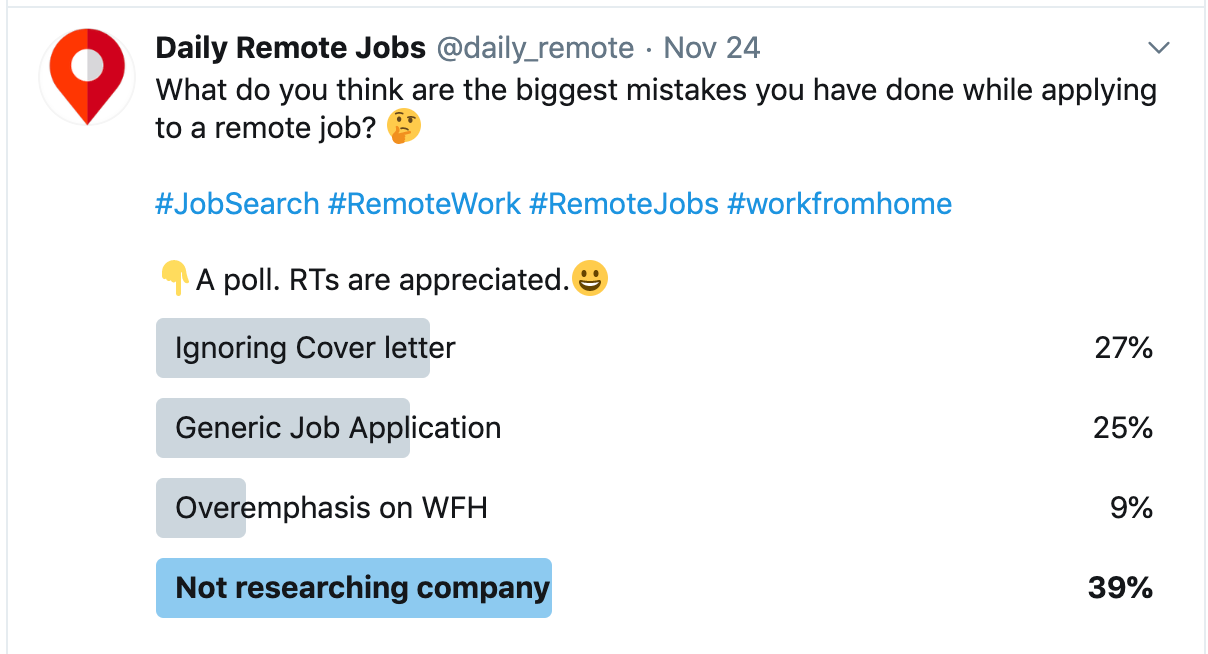
1. Not Researching The Company before Applying
Researching and knowing the company before sending out the application is an essential step in the interview process. Your research should answer questions like these:
- What work/life balance you're looking for in a remote job?
- What is your idea of a successful remote company?
Finding the company's culture, and values will provide you a peek into what it's like to be working at that company. You're not just choosing a company. You're choosing how you're going to work for the next two or more years. If the company's goals and work mantra align with your own beliefs, you'll instantly feel right at home.
Almost every cultural fit interview starts with, "So, why do you want to work with us?" This question opens up an opportunity to show off your career goals and how they coincide with the company's objectives.
Strive to prove yourself as an excellent fit for the organization. Admire the risks and setbacks the company doing remote work, has faced while also praising the outstanding results they have gotten out of it. Describe how you are impressed by the admirable effort the company is making to grow remotely and thus want to learn with them.
Glassdoor is a great source to know the details regarding the views of its employees, along with the ex-employees' opinions. To understand the company's presence online, check their profile on Twitter and LinkedIn as well.
We have compiled a list of questions that you, as an applicant, can ask the company during the interview process or even before interviewing:
- What do they do? Be mindful of their products and services. Analyze their audience and clients.
- What are the company values? Judge if you are passionate enough to work alongside the company's goals and vision.
- What are they looking for in their next hire? Comprehend the skills, experience, and qualities the company values most. Align your skillset with the job requirements mentioned on their careers page.
- What is their company culture like? A company’s culture is demonstrated in everything they do, learn more about the work environment, work-life balance, and any social schemes they offer.
- What does “remote” means for this company? Every company has their definition of being remote within a remote work policy. Sometimes its freedom to complete your task in a given timeframe working-from-home or anywhere, without worrying about being online. Other times it can be having a fixed 6 hr day work with a time tracking software in place.
- Latest events and news about the company? Keep a tab on companies events, press conferences, latest releases, and upcoming products.
- What are the benefits offered by the company to its employees? Do they offer flexible hours? Is there a limit on the number of leaves? Do they provide occasional meetups for the whole team? Some of these details might be present in the job description, but being prepared is a good thing.
- Who are their competitors? Identify their competitors and understand why and how this remote company stands out from the rest.
We talked to several HR and Talent Ops people, all averaged out to the same insight: “Candidates who find out and research about the company before applying, to truly understand the company they’ll be joining, is one of the first clues that potential hire.”
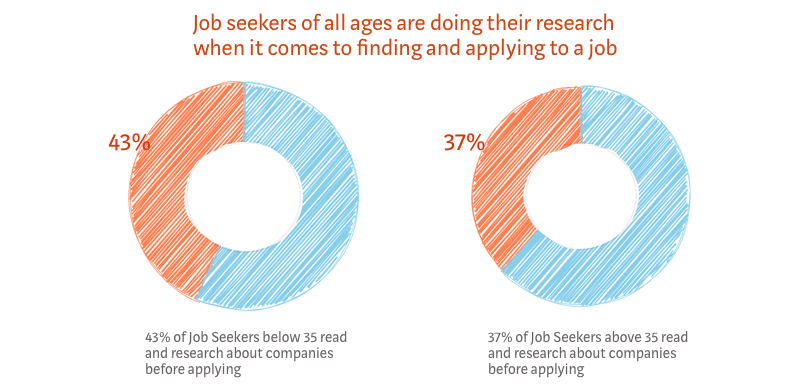
2. Submitting a Generic Resume and Cover Letter
No two jobs are the same in the experience, work, salary, and company culture they offer. Thus companies seeking diverse candidates for various positions shouldn't be surprising. Remote companies go over the extra edge to hire diverse candidates.
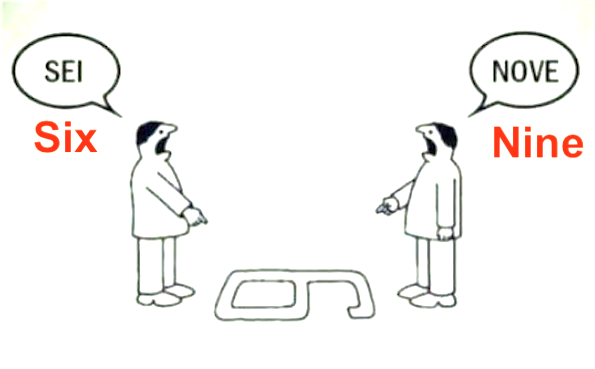
A job application comprised of a customized resume and personalized cover letter is a critical ingredient in your job search. Your application is incomplete without your cover letter. A cover letter manifested with the job requirements set that personal touch.
Trust is an essential factor for companies who are hiring candidates to work remotely or for telecommuting jobs. Overlooking the golden opportunity to introduce yourself with a personalized cover letter, is the silliest mistake one can make. Communication skills are the key to remote jobs, and the cover letter allows you to showcase it.
Related: How to succeed in Remote Job Interviews (without getting lucky)
Now given that you have written a cover letter but, writing a generic cover letter is again a big mistake and complete no-no when applying for a remote job.
While framing a good cover letter, you should refrain from making the following mistakes:
- Rewriting your resume with a lot more words:
A cover letter is not supposed to be an explanation of the details already mentioned in your resume, don’t waste it in repeating your entire work history.
Instead, customize your resume by adding critical points about your skills, career goals, and, most importantly: what value can you add to the company. Attach relevant qualifications and personalize it by answering: “why you think you are a perfect fit for the job”? - Writing a generic cover letter:
Using the same generic cover letter by swapping just the contact person name, company name, and position title to apply to all remote-jobs shows that you don’t care and you are lazy. It shows the lack of passion and extra effort in your application. - Writing a mini-biography:
Believe us, employers are always looking forward to a cover letter attached to a job application. However, they are not looking forward to your life story wrapped in a never-ending cover letter.Almost 70% of employers prefer a cover letter that’s half a page or less. It is advised that 150 words or less, is the best possible length of your cover letter. Cover letters should be concise and enjoyable to read, not lengthy and tedious. - Focusing on soft skills, irrelevant to the job:
Cover letters are not supposed to be biographies. Focusing only on yourself, adding irrelevant information and soft skills, thereby ignoring the job requirements while writing a cover letter is a strict no-no.
Yes, of course, use this opportunity to boast about your strengths and accomplishments but also acknowledge how they will benefit your prospective employer in hiring you. Shift your focus from soft skills, instead pay attention to job-related skills.
“Why should we hire you”?A cover letter should be the answer. The cover letter must present the level of sophistication and dedication you will bring to the job and not some unnecessary details. Let your qualifications speak for themselves, proving you a great fit for the job. - Sharing every single job detail and talking trash about the previous employer:
While you should be honest in a job interview, there are specific details that needn't be shared, especially if they have the potential to do you more harm than anything else.
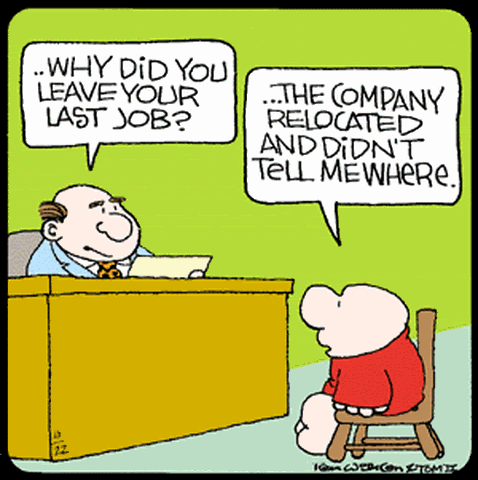
“Why did you leave your last job ?”This question is usually to test how you handle sensitive questions thrown at you by your colleagues and clients..
The correct way to answer is to acknowledge the fact there were some problems in your last job, and your career goals were not aligning with the company’s vision. But maintain a good impression and obviously, do not speak ill of your previous job or boss.
- Knocking yourself out of the race:
Indicating qualities and traits that are in opposition to the company values, and the skills mandatory for the job may push your application to the rejected pile. Acting arrogant, ungrateful, distracted, or upset may entirely through you off in front of the recruiter. Don’t beat yourself out by doing this..
A few of the crucial mistakes done by candidates which deprive them of getting a remote job are:
- The worst mistake you can make is lying or exaggerating your accomplishments, background, and work history.
- Explaining any education gap or lack of skills should not come with excuses; people trust honesty and are a critical factor in remote jobs.
- Never start a cover letter with your name like “I am Mary Jonas”. No, they already have that information.
- Being too rude, arrogant, ungrateful, and overconfident on your cover letter can rat you out, instead try to be polite, professional, and respectful.
- A cover letter is not a place to talk about money, unless stated which happens rarely.
- Don’t direct any unnecessary attention to any lack of professional skills or the knowledge gaps that you have. Never write a statement like “I don’t know this …”.
- Don’t leave typos, proofread it. 70% of hiring managers say they’d automatically dismiss a cover letter with a typo.
- Going all swim fan over the company you are applying:
It's excellent to flatter them, but don't go overboard. Believe us, praising and buttering them up does nothing to fasten the hiring process. Instead, make them believe why to hire you and how qualified you are for the job. Don't go head over heels for them.
3. Sending out resumes to all remote openings
We know, it's very tempting to apply to every remote opening that fits perfectly within your skillset, experience, and salary bracket. But, unfortunately sending out resumes to all remote job openings affects the quality of your job application.
Submitting your application to every opening that resembles a remote job results in low-quality applications. Not fabrication every job application from the start, but substituting it with the same generic application can make your chance of getting hired zero.
Instead, apply only to a handful of companies whose products you love. Focus on some and forget the rest. Research the company and draft a targeted cover letter. Dedicate extra time and effort in networking with their employees and create contacts. Learn all the skills and qualities required for the job. In all, apply with an extraordinary job application that gives you an extra edge and lands you an interview.
4. One-sided interviews
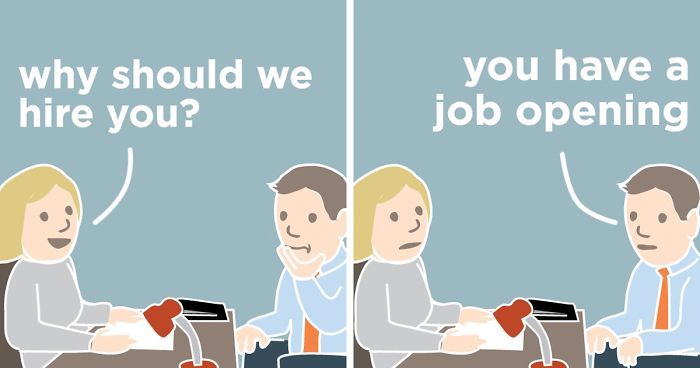
It’s essential to realize that an interview is a two-way street. The interviewer will ask questions based on the role you are applying to. But, if you want the job, impress the interviewer with your answers.
Ask questions. Sound exciting and make it a worthwhile conversation. The questions asked by a candidate often reveal their way of thinking and seriousness about the job.
For starters, prepare a set of questions to ask the interviewer beforehand. Asking questions and indulging in a healthy conversation shows the interviewer your excitement about the job.
Here are a set of essential questions that every candidate should ask their interviewer:
- Hours: What is the company culture regarding the number of hours they’re expecting you to put in? What does remote means for them? Is it a +60hr/wk sweatshop, or do they care if you are online, given your work is getting done?
- Career opportunities: What is the procedure for promotions and raises? What is the time frame in which promotions or an increase in compensation happens?
- Team: Are you working with people you will learn from and admire or a bunch of outsourced consultants? Do you get to jump teams, if you are willing to learn new technologies?
- Vacation: How many days of vacation per year? Personal days? Sick days?Parental leave? Maternity leave?
- Benefits: Meetups, Medical, Pension, Life Insurance, etc. Since you are working remotely, would you be given Office Equipment and Supplies for setting up a home office?
- Notice Period: You never know when your life might change, and you have to jump ship. You should know what their notice period and probation period is.
- Title: You might not think it matters right now, but it matters to your career.
This GitHub repo has a bunch of more questions that will help you practice more questions to ask during an interview.
5. Going overboard with your desire to work remotely
Don’t give your recruiter the impression that working remotely matters more to you than the job itself. Display your passion for working for the company is more significant than the work-from-home.
Obviously, you like to work remotely, and that’s one of the reasons you are applying for a remote job, but don’t overemphasize that. We know things like the freedom to travel and work from anywhere, to be a digital nomad, to spend more time with your family, give time to your hobbies and side projects, etc. are essential perks of a remote job. But these should not overrule your love for your work, because that is why any company will hire you.
Don’t declare bluntly in your cover letter and interview, that your primary motivation for taking a remote job, is to work-from-home and travel the world. Be passionate about the work along with the perks.
If you really want to boast about working remotely and have prior experience working in telecommuting jobs, then show them what you have learned from it:
- Boast about having excellent verbal and written communication skills.
- Show them working remotely does not affect your undermined focus and concentration.
- Your productivity is not influenced by working-from-home as you know how to create boundaries and manage time.
- Constant supervision is not required as you are capable of making decision-related to the product and your projects individually.
- Describe that your qualities and skills are what they are looking for in an ideal remote employee.
6. Not putting enough effort into your job application
Applying to 500 different companies with the same resume and cover letter, and then waiting till eternity for their reply, duh, not going to happen. Don't focus on sending numerous applications to various remote companies, instead focus on quality rather than quantity of applications, sent out to a few companies that you would love to work for.
For job application, Quality > Quantity.
As said by Jason Fried, the CEO of Basecamp, an essential quality he is looking for in a potential candidate apart from job requirement, is clarity and good thought out application.
So the question arises, what should you do then?
Be Chris Gardner from "The Pursuit of Happiness," find a job you love, commit to it, put extra effort into your application, and nail the interview.

NEVER underestimate the power of extra effort. It's an essential quality your employer is seeking in you, why not start right with your job application. Make the job application enjoyable and creative. It should exhibit passion, determination, and fun that you will add to the role.
At Buffer, applications typically ask a few open-ended questions apart from the “cover letter” requirement. Be open to being creative, add suggestions, and adequately thought out answers to increase your chance of getting hired.
Display your genuine interest in the job and eagerness to put in the work to prove that. You don’t want to communicate the message of being lazy by not customizing your application. Always remember for getting hired, it’s not just the work that matters but its quality.
7. Giving up too early on the job search
Did everything just as we said from research to a personalized cover letter with a remarkable job application. Also, had an excellent interview with the employer, indulged in a proper conversation with him, still got rejected.

That is not the end of the world. Sometimes, a company receives so many applications that filtering applications take two weeks or more as information flows much slower in remote companies. Sometimes they are looking for a different set of experience or skills in a person; maybe you lack those skills or experience. DON'T GIVE UP.
Don’t sit expecting a response to your application. If you don’t hear back in 2 or 3 weeks, send a follow-up mail to understand the progress on your application. Instead, the right thing to do is to request feedback after your interview; it might give insights on where you are lacking.
If you’re not getting a reply even after a month of applying, then it’s probably a good idea to revisit your resume and cover letter, reframe it. Go through your LinkedIn profile to fix any grammatical errors it might have. Maybe you’re applying to the wrong jobs, the ones that don’t match your experience level or skills.
Sometimes your job applications are not up to the mark or don't impress the employer. Sometimes, employers who hire remotely look for a few skills in particular, which you don't know.
Hope you can learn from these mistakes and avoid them.

Still facing issues searching a remote job and are not sure where to look. We, DailyRemote are a remote job board and have latest jobs posted in various categories such as software development, marketing, virtual assistant jobs etc.
We also send job alerts as per you desirable categories. So, don't forget to subscribe. Join remote worker community on LinkedIn as well as on Facebook. Now go ahead, get that remote job!
Key takeaways:
- Research, the company. Don't blindly apply to any company. Ask questions, be open-ended in every conversation.
- Don't apply with a generic application. Personalization is the key. If you don't speak keeping a particular individual in mind, you're talking to nobody. Don't mass apply, companies know this.
- Applying to all companies won't get you anywhere. In job interviews, quality > quantity.
- You are going overboard with the desire to work remotely. Do you want to travel the world while sipping Pina Coladas? Probably not a good idea to tell the company you're applying.
- Giving passive interviews won't make you stand out in front of the company. You have to ask the right questions and make a solid conversation so that they remember you.
- Put in the effort in each application. If you're cutting corners, companies might not give you a callback.
- Giving up early, this is a long term game. You cannot apply one day and expect an interview lined up the next day. Sometimes, it can take up to a month to get back to you.

